Dry Nipples During Pregnancy: 5 Tips to Help
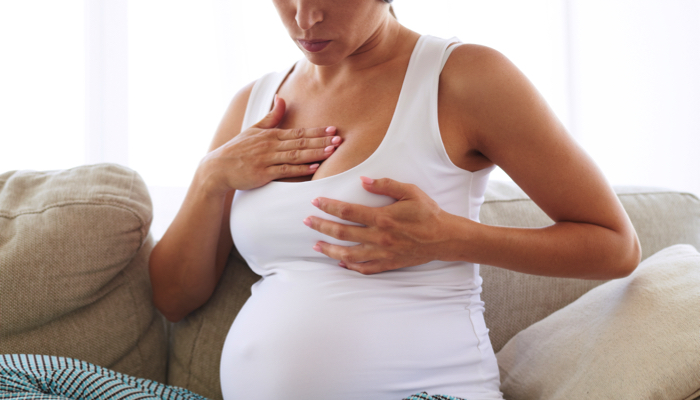
- As your skin stretches in pregnancy. you may experience stretch marks, itchy skin, or dry, irritated nipples.
- Moisturizing your nipples is important to keep them from becoming too irritated.
- Avoid washing breasts with soap as this will leave your skin dry.
While you sit at home wondering what your baby will look like or pondering baby names, you might also be curious about all the symptoms you’ve noticed lately.
Pregnancy brings on a host of symptoms that many women don’t expect. From fluid retention, to stretch marks, to morning sickness, there are a variety of unexpected changes! One of these symptoms is dry nipples.
As your breasts begin to swell and your skin expands, you might notice that your nipples feel dry. They might even be cracked or itchy. While this can be extremely bothersome, it’s usually harmless.
Hormonal changes during pregnancy are often the culprit of these unpleasant symptoms. However, it helps to know that what you’re experiencing is normal and nothing to rush off to the doctor over.
If you’re wondering if your nipple symptoms are normal, or how to treat them, we’re here to help! Let us put your mind at ease and break down the basics of dry nipples during pregnancy.
Why Does Pregnancy Cause Dry Nipples?
So you’ve noticed your growing breasts and nipples are dry and itchy. What causes itchy breasts in pregnancy?
More than likely pregnancy hormones are to blame. However, the hormones can cause a variety of issues which might lead to dry nipples.
You might be experiencing one of the following:
- A normal increase in progesterone production
When you become pregnant, your ovaries increase the production of progesterone. Progesterone is a hormone that helps prepare your uterus for pregnancy. It also keeps your uterus from contracting and releasing the baby early.
Around 8 weeks, your placenta increases the progesterone production to even higher levels. This increase continues through the second or third trimester.
Progesterone keeps your body from releasing more eggs. It also signals your body to prepare for breastfeeding.
Progesterone is the reason behind enlarged, sore breasts and sore nipples in pregnancy. This hormone causes increased blood flow to your breasts and makes them swell.
Progesterone prepares the milk ducts for initial milk production and breast milk flow. As the skin expands. you may experience stretch marks, itchy skin, or dry, irritated nipples.
You might notice stains from breast milk in your bra in your second trimester or later. This substance is colostrum. Pregnant women often leak milk as their pregnancy progresses and their mammary glands grow.
This is all in preparation for the beautiful moment of bonding and breastfeeding your newborn.
- Eczema
Pregnancy-related eczema is a common symptom of pregnancy. The increase in hormone production can create dry, itchy patches around your breasts. You might also notice patches on other parts of your body. r
If you have itchy breasts, patches of dry, scaly skin, and cracked nipples, eczema might be the culprit. (Eczema is also common in babies.)
Eczema is the most common skin condition during pregnancy. Most women experience symptoms of eczema in the first two trimesters. If you’ve had atopic dermatitis in the past, this increases your likelihood of pregnancy-related eczema.
Certain detergents, lotions, or soaps can make this condition worse.
- Yeast infection
Another pesky symptom of pregnancy is a fungal infection with Candida Albicans.
Candida albicans are a normal part of your body’s microbiome. They are found in the mouth, vagina, and gut.
When you’re pregnant, your immune system is suppressed. This lowered immune system opens the door for Candida overgrowth.
Candida overgrowth, or Candidiasis, is responsible for yeast infections. Many women think of yeast infections happening in the vagina.
Your nipples can also develop a yeast infection, though. This infection is known as nipple thrush.
In breastfeeding mothers, this is often passed to the baby and causes a white tongue or diaper rashes. The symptoms of nipple thrush include a burning sensation or shooting pain in your nipple, dry or shiny skin around or on the nipple, or cracked nipples.
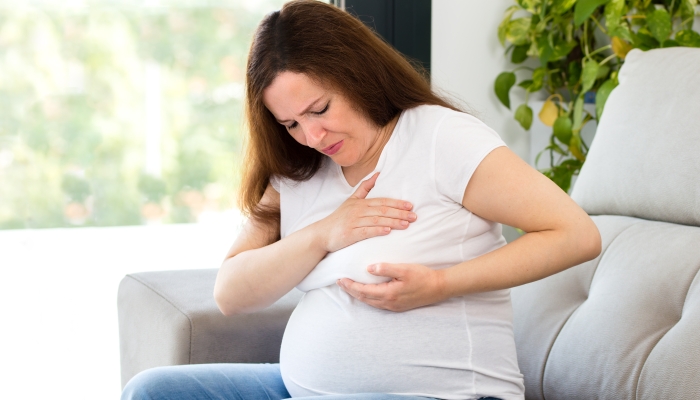
What Does It Mean When Your Nipples Are Dry During Pregnancy?
Nipples that are dry during pregnancy might cause concern. Yet, there is usually no reason to worry, unless other, more serious, symptoms are present. Dry nipples are completely normal during pregnancy.
This symptom just means your body is doing exactly what it should be. It’s producing a healthy amount of the pregnancy hormone needed to keep your baby safe.
Is It Common to Have Dry Nipples During Pregnancy?
Dry, itchy, or even sore nipples are common symptoms in early pregnancy. This can start as soon as the first trimester when your breasts are stretching and growing. The rapid increase of blood flow to the breasts can intensify the dryness as well.
What Can I Use for Dry Nipples During Pregnancy?
Moisturizing your nipples is important to keep them from becoming too irritated. While you can use lotions, you’ll want to avoid ones with fragrances or harsh chemicals.
When choosing products for dry or chapped nipples, be sure to look for gentle ingredients. Often, simple products yield the best results.
Some of our favorite items to use for dry, itchy nipples include:
- Cocoa butter
- Shea butter
- Coconut oil
- Gentle nipple creams
How to Clean Dry, Crusty Nipples During Pregnancy
To clean dry, crusty nipples, use a warm, wet, soft cloth and pat gently. Do not excessively rub the area as it will cause further irritation. Do not use soap when cleaning the breast area.
You can also try gently rubbing your nipples with oil. This will help remove any grime without drying out your skin.
How to Relieve Dry Nipples During Pregnancy
Treatment for dry skin on your nipples depends on the cause. If there doesn’t appear to be an underlying cause other than hormones, you can use these 5 tips to soothe your breasts and nipples.
- Wear loose-fitting shirts.
Now, this doesn’t mean you need to throw out anything that clings to your body. Just keep in mind that tight-fitting shirts will keep your bra close to your nipples, causing friction.
- Wear a lightweight cotton bra that fits properly.
Now is not the time for lacy and thick bras. Your breasts and sensitive nipples need room to breathe and soft materials. Opt for cotton, breathable bras that fit you well.
- Apply a nipple cream to cracked nipples.
If you’re not already familiar with lanolin, you likely will be soon! Lanolin is a favorite of breastfeeding mothers. This soothing ointment is used for sensitive, cracked, or sore nipples. Apply on sore nipples to help them heal fast.
- Apply a gentle moisturizer.
One of the best ways to treat dry or itchy nipples is to keep them moisturized. Keeping the skin supple with a gentle lotion or oil reduces the likelihood of irritation.
Applying olive oil or coconut oil to your breasts and nipples is a simple way to keep them moisturized. (As a bonus, olive oil is thought to prevent stretch marks and coconut oil may help lighten existing ones.)
- Avoid washing breasts with soap.
Next time you shower, resist the urge to lather up with soap around your breasts. Though soap makes you feel clean, it can often remove moisture from your skin. This is why choosing gentle soaps and lotions is so important.
Unless you use an irritant-free option like goat’s milk soap, skip the suds. Use warm water and a gentle cloth and let your nipples dry completely.
Treating Eczema
Eczema can be difficult to get rid of, but there are several things you can do to minimize symptoms.
Showering in warm water instead of hot will soothe the affected area. After you shower, dry your breast skin completely.
Apply a moisturizer like shea butter or cocoa butter. Keeping irritated skin moisturized is key.
In addition, increase the amount of water you drink to promote hydration. If you live in a dry climate, adding a humidifier to your home may also help. Choose detergents, lotions, and soaps that are gentle and free of common irritants.
Talk to your doctor about additional recommendations or other concerns you may have.
Treating Nipple Thrush
If you have a yeast infection on your nipples, see your doctor. You will need an antifungal prescription to treat the fungal infection.
You can do several things to prevent thrush and manage symptoms until it clears. When possible, give your breasts time to air out without cover. Yeast thrives in warm, moist conditions like in your bra.
Wear thin cotton bras and loose-fitting t-shirts to increase airflow. Wash all clothing that comes in contact with the breasts in hot water to kill any fungus.
Many pregnant women and breastfeeding moms benefit from taking a probiotic daily. This helps balance the yeast and bacteria in their digestive system.
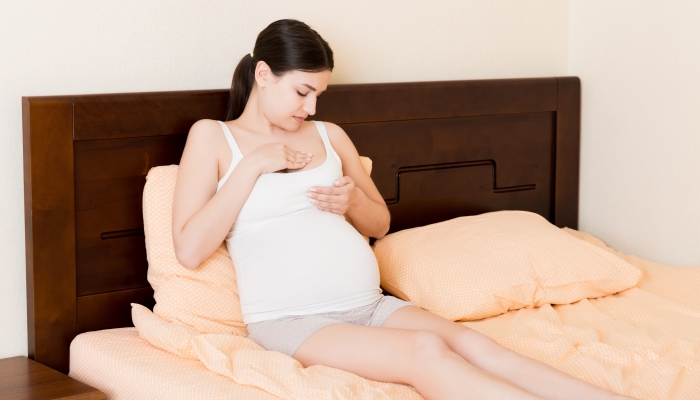
How to Prevent Dry Nipples During Pregnancy
Despite efforts, you may still experience dry nipples as a result of hormone changes. However, keeping your breast moisturized will minimize dryness.
When to See a Doctor
There are symptoms, including abnormal nipple discharge, which indicate more serious issues. These symptoms might be:
- A lump in the breast with discharge
- Bloody nipple discharge
- Bleeding cracked nipples
- Oozing sores on nipples
- Yellowish discharge
- Suddenly inverted nipple
See your doctor for any of these symptoms.
FAQs
What’s the Difference Between Dry Nipples and a Nipple Fissure?
Dry nipples are often itchy or flaky but don’t cause major pain. Nipple fissures, however, are painful.
Nipple fissures are deep cracks that might ooze or bleed. They are painful to the touch and require greater care.
Chafing, breastfeeding, and stretching skin can all cause fissures. When too much friction or pressure is put on the nipple, the area sometimes splits. This is common when there is an improper nipple latch in breastfeeding or in babies who prefer to use mom as their pacifier.
Infection might occur in nipple fissures if the proper cleaning and care aren’t started. Nipple fissures should be cleaned and coated in ointment. This prevents bacteria from entering the wound and infecting the fissure.
Why Are My Nipples Peeling?
When your nipple skin stretches, it might cause them to peel. This is normal.
However, it’s important to apply a lanolin ointment to avoid complications. Left untreated, peeling nipples could start bleeding or oozing.
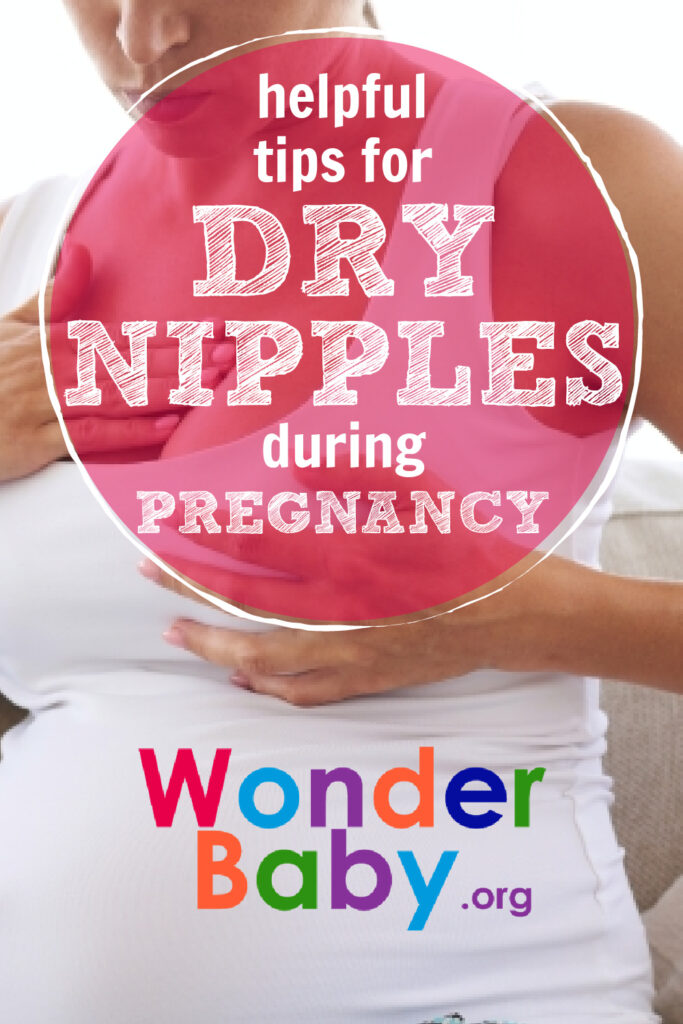
The information WonderBaby provides is not intended to be, and does not constitute, medical or other health advice or diagnosis and should not be used as such. Always consult with a qualified medical professional about your specific circumstances.
Related Posts
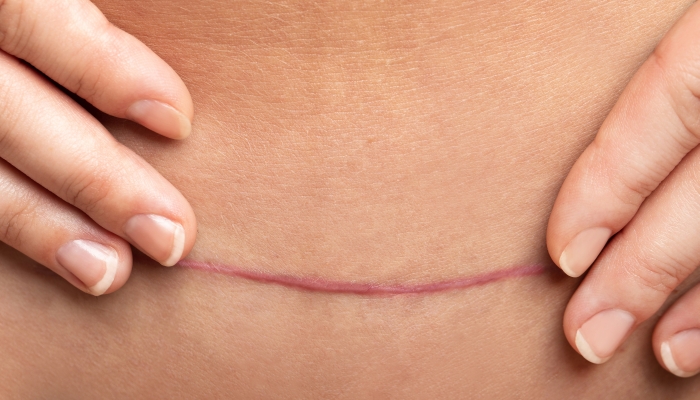
Pregnancy
How To Deal With an Ingrown Hair on a C-Section Scar
Ingrown hairs on a C-section scar can be treated using a warm compress or mild exfoliation. Infected ingrown hairs may require antibiotic treatment.
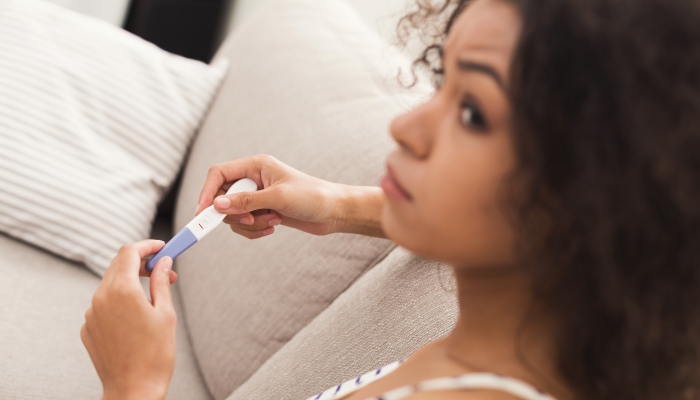
Pregnancy
What’s a Dye Stealer Pregnancy Test?
A dye stealer pregnancy test usually means that your hCG levels are very high, which is typically considered a good sign for pregnancy.

Pregnancy
Can Yelling Cause a Miscarriage?
Yelling alone can not cause a miscarriage. However, maternal stress can cause high blood pressure, preterm labor, and other health problems.